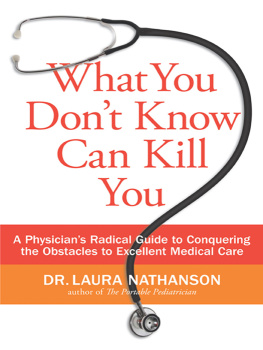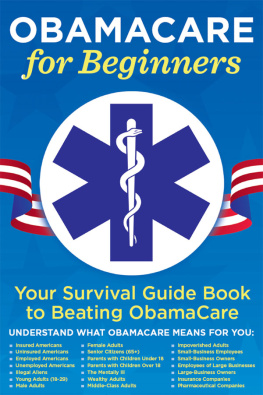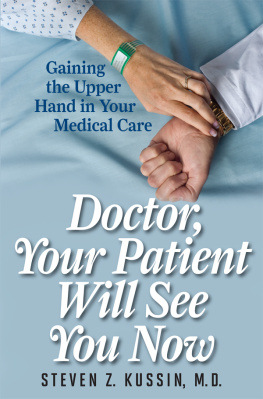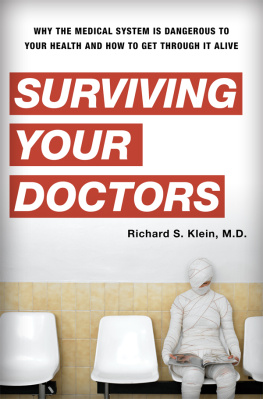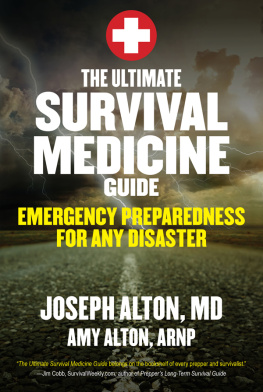SURVIVING THE
MEDICAL MELTDOWN
SURVIVING THE MEDICAL MELTDOWN
Copyright 2015 Dr. Lee Hieb
All rights reserved. No part of this book may be reproduced in any form or by any means electronic, mechanical, photocopying, scanning, or otherwise without permission in writing from the publisher, except by a reviewer, who may quote brief passages in a review.
Published by WND Books, Washington, D.C. WND Books is a registered trademark of , Inc. (WND)
This book is intended for informational purposes only. It contains general information about medical conditions and treatments and home remedies. Neither the author nor the publisher claims that anything presented is true, accurate, proven, and/or not harmful to your health or well-being. Any information associated with this book should not be considered a substitute for medical advice from a health care professional. If you are experiencing any form of health problems, always consult a doctor before attempting any treatment on your own. Neither the author nor the publisher will be held liable or responsible in any way for any harm, injury, illness, or death that may result from the use of the content herein or anything related to it.
Book designed by Mark Karis. Illustrations by Michael Di Pietro.
WND Books also publishes books in print formats.
WND Books are distributed to the trade by: Midpoint Trade Books, 27 West 20th Street, Suite 1102, New York, New York 10011
WND Books are available at special discounts for bulk purchases.
WND Books also publishes books in electronic formats.
For more information call (541) 474-1776 or visit www.wndbooks.com.
THE HOLY BIBLE, NEW INTERNATIONAL VERSION, NIV Copyright 1973, 1978, 1984, 2011 by Biblica, Inc. Used by permission. All rights reserved worldwide.
Hardcover ISBN: 978-1-938067-02-0
eBook ISBN: 978-1-938067-03-7
Library of Congress Cataloging-in-Publication Data
Hieb, Lee D.
Surviving the medical meltdown : your guide to living through the disaster of Obamacare / Lee Hieb.
pages cm
Includes bibliographical references and index.
ISBN 978-1-938067-02-0 (pbk.)
1. Medical care United States. 2. Medical policy United States. 3. Medical economics United States. I.
Title.
RA395.A3H543 2014
362.10973 dc23
2014031613
To Ernie Rillos, MD, 19562009
Former Navy Corpsman, Orthopaedic Surgeon, and Friend
CONTENTS
ACKNOWLEDGMENTS
T here are many people who contributed to the writing of this book. Ralph Weber was a great help in understanding and discussing insurance options. The members of the Association of American Physicians and Surgeons, and particularly Dr. Jane Orient, have helped me to appreciate the meaning of individual liberty and the importance of limited government, free markets, and medical ethics. And of course I thank my sons, Mason and Nathan, for their enlightening Socratic discourse.
INTRODUCTION
Y ou may have thought about surviving an economic or political collapse how you would eat and how you would defend your family and property and things like that. But have you thought of how you would obtain medical care at times of economic collapse?
Over the years, surgeons have traditionally congregated in surgeons lounges and discussed interesting or difficult cases. In the last decade, I have found my life as a surgeon has changed considerably, and now, while sitting around with my colleagues, I take part in discussions about surviving the bureaucratic nightmare of Obamacare and Medicare, managing our practices to avoid financial collapse, investing in precious metals, buying weapons and ammunition, food storage, and other survival issues. Physicians are smart people, and most of us feel bad times are coming. I have taken steps to move back to my rural hometown, downsize my debt, and relearn some of the self-reliance of my pioneer ancestors. But along with that, I have thought about medical care for my family and myself, and for my community, in times of national crisis.
If we experience the kind of economic collapse experienced by Argentina and Russia in the last decade, Zimbabwe or the Weimar Republic before that, where will we get medical supplies and expertise? I began thinking of my fathers small-town practice and how self-sufficient he was. I thought about my Navy training and experience and the difficulties of rendering emergency medical care in isolated places with minimal supplies and no trained medical specialists for assistance. From that consideration, I have planned for my own and my familys medical security. This book will help you do the same. The goal of this book is to help you to:
Recognize the signs of the impending collapse of the medical system.
Prepare yourself and others to be as healthy as possible.
Be more self-sufficient when medical issues do arise.
Learn to navigate the difficult world of health insurance when finding a physician.
Create a medical stockpile for times when supplies are not available.
PART 1
THE COMING COLLAPSE
1
HOW WE GOT HERE
A merica has been the great experiment in individual liberty. Our Declaration of Independence and our Constitution were intended to create a government with one purpose to safeguard the God-given rights of its citizens. But nearly from the time of this countrys founding, certainly in the last one hundred years, Americans have strayed from the principles in those founding documents and have asked the government to do more than protect the rights to life, liberty, and private property they have asked government to insure their safety.
It seemed innocuous enough at first. Who better than the federal government to keep watch over our food supply? And it makes sense that government requires its citizens to exercise prudent precautions such as wearing seatbelts or motorcycle helmets. Doesnt it?
Well, the problem is that government cannot make us safer, but it can make us infinitely poorer in the attempt. As Thomas Jefferson so presciently opined, If we can prevent the government from wasting the labors of the people, under the pretense of taking care of them, they must become happy. Although Jefferson had no inkling of Medicare or God help us Obamacare, he perfectly described government-run health care in all its ugly forms.
In 1965, Lyndon Johnson, as part of his Great Society programs, instituted Medicare and subsequently Medicaid. Since then, the cost of medical care has skyrocketed, taxpayers have been milked dry, people have become more and more unhappy about the care they receive (we now have a patient bill of rights, not needed before Medicare), and in general, it is harder and harder to get the care we need. Although ignored by the pundits, the reasons are very straightforward once we deconstruct the effect of government on the practice of medicine, which is fundamentally the same as the effect of government on well, anything! Government produces nothing. It only regulates and appropriates.
To get an idea about how government makes everything in medicine scarcer and more expensive, lets look at the pharmaceutical industry. The government does not invent any new medicine; it only makes it harder for others to invent treatments by overregulating researchers. Whereas drugs once were brought to market quickly, limited only by the time it took to do safety studies and marketing (as with each new generation of iPod and iPhone), now it takes on average fifteen years of a major pharmaceutical corporations time to get through the government morass. That carries a huge price tag. And the delay is not due to more thoroughness but to more stultifying paperwork that FDA regulators confuse with actual research and thinking about drug safety and efficacy. Although the proposition is that this makes us safer, consider this: When the FDA says they are saving thirty-five thousand lives this year by passing a new drug, in actuality their institutional stall cost roughly thirteen years times thirty-five thousand lives
Next page


